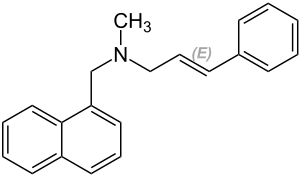Naftifine
 | |
| Names | |
|---|---|
| Trade names | Naftin,[1] Exoderil, others |
IUPAC name
| |
| Clinical data | |
| Drug class | Antifungal |
| Main uses | Athlete's foot, joke itch, ring worm[2] |
| Side effects | Irritation, redness, itching, burning, allergic reaction[1] |
| WHO AWaRe | UnlinkedWikibase error: ⧼unlinkedwikibase-error-statements-entity-not-set⧽ |
| External links | |
| AHFS/Drugs.com | Monograph |
| MedlinePlus | a688020 |
| Chemical and physical data | |
| Formula | C21H21N |
| Molar mass | 287.406 g·mol−1 |
Naftifine sold under the brand name Naftin among others, is an antifungal medication used to treat athlete's foot, joke itch, and ring worm.[2] While it has some benefit against candidiasis other medications are better.[2] It is applied to the skin as a cream or gel.[2]
Side effects occur in less than 5% of people.[1] These may include irritation, redness, itching, burning, and allergic reaction.[1] There is no evidence of harm in pregnancy, though such use is not well studied.[3] It is similar to terbinafine and is believed to work by blocking sterol biosynthesis.[4][2]
Naftifine was approved for medical use in the United States in 1988.[2] In the United States a 45 gram tube costs about 85 USD as of 2021.[5] It is not available in the United Kingdom.[4]
Mechanism of action
Its precise mechanism of action is unknown, but may involve selectively blocking sterol biosynthesis via inhibition of the squalene 2,3-epoxidase enzyme.[6][7] It is also an anti-inflammatory.[2]
Chemistry
The half-life is approximately 2–3 days.[7] The metabolites are excreted in the urine and feces.[8]
References
- 1 2 3 4 Gupta, Aditya K.; Mays, Rachel R.; Folley, Kelly A. (2019). "42. Topical antifungal agents". In Wolverton, Stephen E.; Wu, Jashin J. (eds.). Comprehensive Dermatologic Drug Therapy (4th ed.). Elsevier. p. 486. ISBN 978-0-323-61211-1. Archived from the original on 2021-10-09. Retrieved 2021-10-07.
- 1 2 3 4 5 6 7 "Naftifine Monograph for Professionals". Drugs.com. Archived from the original on 19 July 2021. Retrieved 11 November 2021.
- ↑ "Naftifine topical Use During Pregnancy". Drugs.com. Archived from the original on 23 November 2020. Retrieved 11 November 2021.
- 1 2 Ritter, James M.; Flower, Rod; Henderson, Graeme; Loke, Yoon Kong; Rang, Humphrey P. (2020). "54. Antifungal drugs". Rang & Dale's Pharmacology. Elsevier. pp. 690–695. ISBN 978-0-7020-7448-6. Archived from the original on 2021-08-28. Retrieved 2021-10-07.
- ↑ "Naftifine Prices, Coupons & Savings Tips". GoodRx. Retrieved 11 November 2021.
- ↑ Robertson Dirk B, Maibach Howard I, "Chapter 61. Dermatologic Pharmacology" (Chapter). Bertram G. Katzung, Susan B. Masters, Anthony J. Trevor: Basic & Clinical Pharmacology, 11e: http://www.accesspharmacy.com/content.aspx?aID=4517257 Archived 2012-03-03 at the Wayback Machine.
- 1 2 Micromedex DRUGDEX Drug Point: Naftifine Hydrochloride. Accessed at www.thomsonhc.com/../BeginWith#secN10184 Archived 2019-12-17 at the Wayback Machine, February 18, 2010.
- ↑ AccessPharmacy: Drug Monographs: Naftifine. Accessed at http://www.accesspharmacy.com/drugContentPopup.aspx?mid=6620§ion=10 Archived 2012-03-03 at the Wayback Machine, February 18, 2010.
External links
| Identifiers: |
|---|